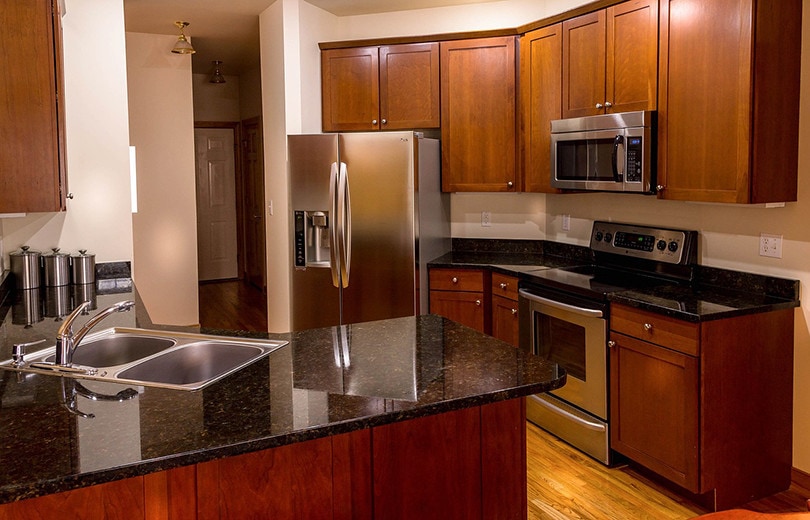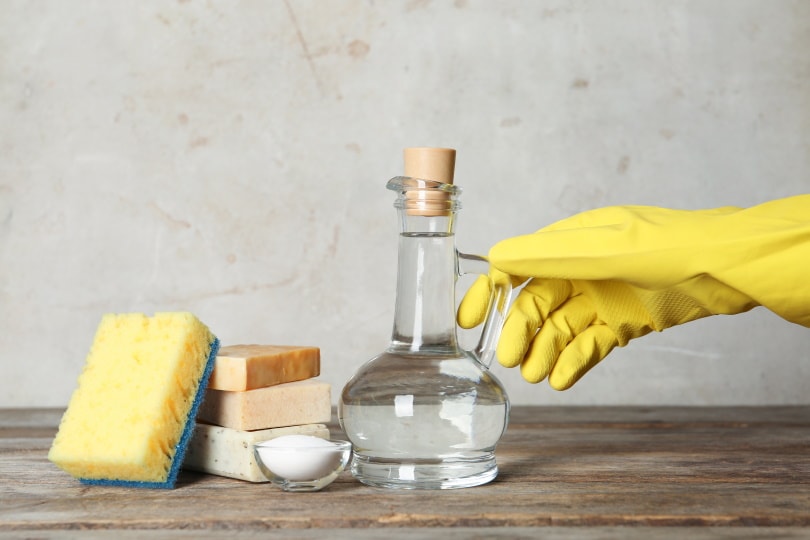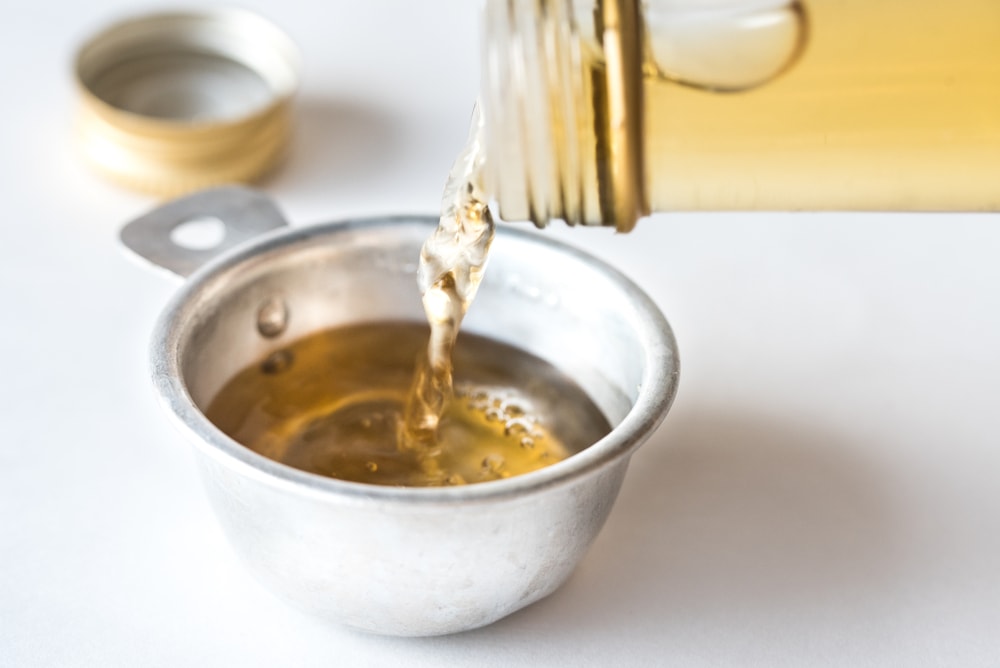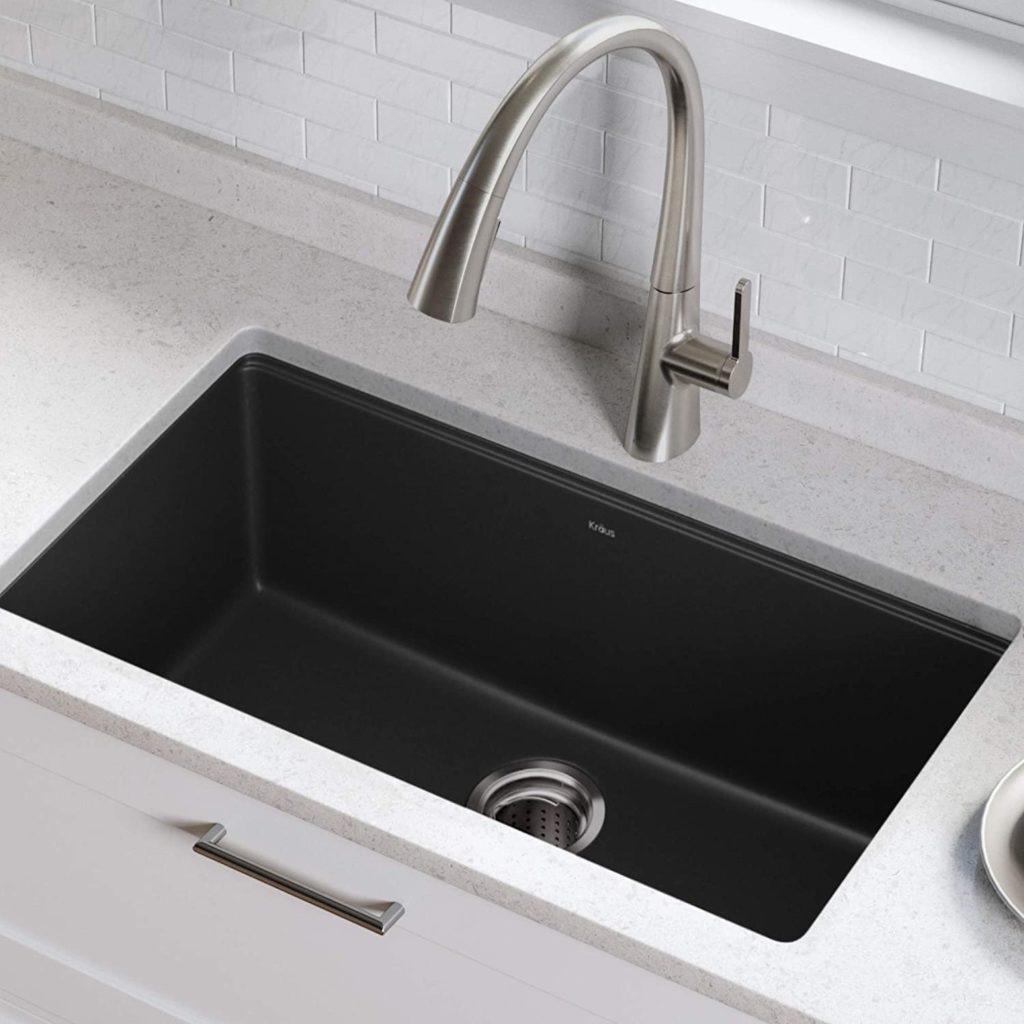Can You Clean Granite With Vinegar? Facts & FAQ
-
Pete Ortiz
- Last updated:

Granite is known as the most commonly-used igneous rock on the planet. You can see it practically everywhere, including monuments, stairs, floor tiles, and, of course, countertops. It boasts an impressive lifespan and takes minimal effort to clean. However, it’s highly vulnerable to vinegar. Why is that, exactly? Vinegar damages the sealant and makes the stone dull.
So, what cleaning product should you use, then? What’s the expected lifespan for granite? Is vinegar toxic for all surfaces, or maybe you can use it to clean something else around the house? These are just some of the questions that we cover in this guide.
Read on if you want to learn how to clean your countertops properly!
 What Is Vinegar?
What Is Vinegar?
Commonly used in cooking, pickling, and as a condiment/garnish, vinegar is a product of fermentation. To formulate it, you need to first extract the sugar from a natural product, like grains, fruits, or potatoes. Next, that sugar is converted into ethanol/alcohol. The best way to do that is to use yeast. The final stage of the fermentation process is turning that ethanol into acetic acid.
There are dozens of different vinegar products out there, and most contain 5–8% of acetic acid. Cooking vinegar, also known as white distilled vinegar, is safe to eat. It’s only 5% acid and 95% water. However, while you can, indeed, use it against grease and dirt, it’s not nearly as effective as cleaning vinegar, which is 6% acid. On the downside, cleaning vinegar is harmful to humans and pets and is NOT consumable.
So, Can You Use It on Granite?
Let us say right from the start that vinegar is bad news for stones such as marble, limestone, and granite. While these rocks are very tough, resilient, and impact-resistant, the chemical compound of vinegar isn’t something they can handle easily. This is especially true for vinegar with above-average acidity levels. What exactly happens when you scratch granite with vinegar?
Granite has a porous nature. That means any liquids that you spill on the countertop (or any other surface) will eventually leak deep into the stone. And vinegar is like granite’s kryptonite: it makes it etch and dull. To improve its strength and prolong its lifespan, consider using a sealing product.
While it won’t be able to fully protect the granite from vinegar (the acid will make short work of it), that extra “layer of defense” will minimize the damage.
- Natural stones
- Cast iron
- Stainless steel appliances
- Stainless steel knives
- Rubber parts (hoses/gaskets)
- Electronic devices (TVs, laptops, tablets)
- Natural/unfinished wood
What Are the Alternatives to Vinegar?
Granite is an easy-to-clean material. Most stains can be removed with a simple rag. Dip it into lukewarm or even hot water, squeeze the rag once or twice to remove excess water, and get to work! A quick note: only use soft (microfiber) cloth, rags, and towels. Abrasive tools will only make matters worse by scratching the granite. Now, if the stains are a bit stubborn, dish soap will come to the rescue.
Don’t do anything extreme: a mild soap product will be more than enough for the job. Acidic cleaners and other chemical-heavy solutions are not recommended here. Earlier, we said granite is a porous stone, which is very much true. However, it’s not as bad as marble, and you’ll have plenty of time to clean the mess before it soaks into the countertop.

Do Cleaning Products Work?
Not happy with how water and dish soap perform? Then go with a disinfectant cleaner. There are lots of options on the market. The key here is to find a solution that was specifically formulated with granite in mind. That way, you won’t have to worry about damaging the countertop, sink, or floor.
How Long Does Granite Last?
Highly resistant to water, heat, and stains, granite is a sought-after rock. People have been using it for construction and decorative material for thousands of years. More importantly, it has an extended lifespan compared to marble and other stones. For example, if you’re good at maintenance, a granite countertop will serve you for at least 30 years.
The average life cycle is much higher, and the rock will, most likely, stay in good shape for 4–5 decades or even longer. It all depends on how well you take care of it. Granite is weak against grease and dirt, more specifically, juices, alcohol, and oils. As mentioned, it’s quick to absorb it all, which leads to deterioration. On the bright side, these liquids aren’t nearly as hazardous as acid and won’t be able to break through a layer of sealant.

Most Common Uses for Granite
When asked about granite, the first thing that probably pops up in your head is a monument or a countertop. This eye-catching stone has many different applications, though. It’s commonly used both indoors and outdoors, thanks to its impressive weather resistance.
- Countertops and backsplashes. Kitchens and bathrooms won’t be the same without a countertop. And, since granite is impact-resistant, durable, and beautiful, it’s a go-to choice for countertops. The same is true for backsplashes. Easy to clean and practically immune to water, this stone is almost perfect!
- Speaking of bathrooms, granite is a cheap and long-lasting solution for shower walls and floors. To play it safe, we recommend applying a layer of sealant to it.
- Tables and shelves. While granite can be heavy, it does look great as a table or a shelf. And if you’re going for a rustic/rural vibe, the stone won’t even have to be super smooth or anything like that. Again, sealing the surface will make it last longer.
- Floors and other surfaces. Reflective, natural, and resistant to foot traffic, granite floors are very popular these days. But what if you’re going for an open/outdoor kitchen, patio, or walkway? Will granite work? Absolutely, because it easily handles extreme heat!
- Granite is the by-product of volcanic eruptions, which makes it an igneous rock. That’s why it’s not afraid of abnormally high temperatures and will be just right for fireplace surrounds.
Which Surfaces Does Vinegar Work On?
Granite and vinegar don’t go well with each other. However, vinegar is still a popular “folk remedy” against stains. It’s a very powerful cleaning agent that you should always keep handy. It can make a dirty floor, sink, steel pot, and stovetop look brand-new. On top of that, it’s highly effective at cleaning messes created by pets, coffee stains, and even mineral deposits.
So, if your dog or cat just wet the floor or, let’s say, the bed, and you don’t have any cleaning products at home, vinegar will help you deal with the “situation”. Just don’t use it on granite! You probably have at least half a bottle of vinegar in the kitchen somewhere ready to use. If not, just get it at a local store.
- Faucets and sinks
- Showers, tubs, and toilets
- Dishwashing machines (the exterior)
- Microwave and coffee/tea makers (the exterior)
- Stainless steel/enamel pots and pans
- Sheet pans and blenders
- Refrigerators/freezers (the exterior)
- Windows and glass panels
- Floors (no hardwood or stone)
- Chopping boards
Now, before you clean any machines and appliances with vinegar, check the instructions first. As mentioned, rubber doesn’t go well with vinegar: the acid can melt all the hoses and gaskets. And there are a lot of rubber parts in dishwashers and microwaves. To play it safe, only use vinegar on the exterior, not the interior.
 In Conclusion
In Conclusion
Using vinegar on granite is a very bad idea. While it will get rid of all the dirt, grime, and grease, it will also damage the stone, which is not something that you want to deal with! Fortunately, there are more than enough tried-and-true alternatives to this acidic solution, and they come at a reasonable price. Don’t use any harsh scrubbers, be gentle with the sponge, and you should be good.
But don’t write off vinegar just yet! Not only is it an excellent ingredient for your next meal but also a highly efficient cleaning solution. As long as you use it on hardware, appliances, and surfaces that can handle vinegar and won’t deteriorate or fade, you’ll be amazed by how strong it is.
- You Can Use Cleaning Vinegar to Clean Almost Everything
- Vinegar: The Multipurpose, Chemical-Free Household Cleaner
- Harvard T.H. Chan: The Nutrition Source – Vinegar
- What Is Cleaning Vinegar and How to Use It
- RockWithUs – How long do granite countertops last?
- The Lifespan of Granite Kitchen Countertops
- BEST WAY TO CLEAN GRANITE COUNTERTOPS
- Most Popular Granite Uses: Home Surfaces and More
- Pros & Cons of Granite Countertops
Featured Image Credit: JamesDeMers, Pixabay
Contents

 What Is Vinegar?
What Is Vinegar?
